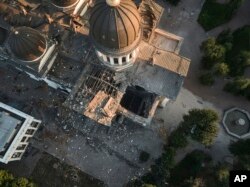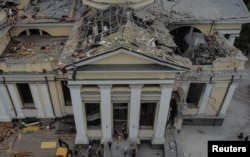On July 23, a barrage of Russian missile and drone strikes on the Ukrainian city of Odesa killed at least one person and wounded 22 others. Dozens of buildings, including the Transfiguration Cathedral, part of a UNESCO World Heritage Site, were damaged in the attack.
It was the latest in a series of strikes on the southern port city after Ukraine attacked the Kerch Bridge — which links Ukraine’s occupied Crimean Peninsula with Russia — on July 17, killing two.
Russia, which vowed retaliation for the bridge attack, continued its pattern of denying systematic attacks on Ukraine’s civilian infrastructure.
“All the facilities designated for defeat and destroyed on the night of 23 July this year, where the Kiev regime, together with foreign specialists, were preparing terrorist acts against the Russian Federation, were located at a safe distance from the Transfiguration Cathedral,” Russia’s Defense Ministry said in a July 23 Telegram post.
“The planning of strikes with precision weapons against military and terrorist infrastructure facilities of the Kiev regime is carried out on the basis of information carefully checked and confirmed through several channels, knowingly excluding the civilian facilities, as well as cultural and historical heritage sites.”
That is false.
Russia’s July 23 strikes on Odesa destroyed and damaged 44 buildings and sites of cultural significance. Russia provided no evidence to back its claim that the civilian buildings struck in the attack were being used to “prepare terrorists acts.”
The July 23 strikes on Odesa fit into a broader Russian assault on Ukraine's civilian infrastructure, which President Volodymyr Zelenskyy a year ago called “missile terror.”
Russian forces have been hammering Odesa’s port infrastructure and food export facilities since Moscow withdrew from an agreement that allowed Ukraine to export grain from its Black Sea ports, helping avert global food insecurity.
Civilian and cultural sites have also been hit. The Odesa regional administration said 44 buildings, including 19th and 20th century sites and 25 cultural monuments, were damaged in Russia’s July 23 missile barrage.
UNESCO strongly condemned Russia’s “repeated attacks” against Ukraine’s cultural and world heritage sites.
“This outrageous destruction marks an escalation of violence against cultural heritage of Ukraine. I strongly condemn this attack against culture, and I urge the Russian Federation to take meaningful action to comply with its obligations under international law,” UNESCO Director-General Audrey Azoulay said.
As of July 20, UNESCO had verified damage to 270 cultural properties in Ukraine since Russia invaded on February 24, 2022.
The cultural properties hit in the Odesa region include the Odesa Fine Arts Museum, the Odesa Archaeological Museum, the Odesa Maritime Museum, the Odesa Literary Museum and the St. Nicholas Church.
In January, UNESCO declared Odesa’s historic city center, where the Transfiguration Cathedral is located, a UNESCO World Heritage site.
Reports indicate a missile directly hit the Transfiguration Cathedral’s central altar, causing significant damage to the building.
As it has done repeatedly after targeting civilian infrastructure in Ukraine, Moscow blamed Kyiv for the cathedral strike, claiming it was hit by a Ukrainian anti-aircraft guided missile.
Despite Russia’s claim that it used “precision guided weapons” in the strike on Odesa, Zelenskyy said the Transfiguration Cathedral was hit by a KH-22, a high-speed missile designed to sink aircraft carriers. Britain's defense ministry said the KH-22 is “notoriously inaccurate” when aimed at land-based targets.
In January, Russia hit an apartment building in the central Ukrainian city of Dnipro with a KH-22, killing 40 people.
Kremlin spokesman Dmitry Spokesman Dmitry Peskov blamed that attack on Ukraine’s air defenses.
In the July 23 attack targeting the Odesa region, Ukraine said it shot down nine of the 19 missiles that Russia reportedly fired.
Ukraine said Russia targeted Odesa that day with at least five different types of missiles, partially to thwart Ukraine’s ability to intercept them.
The only air and missile defense system Ukraine has that can shoot down KH-22 missiles are U.S. Patriot missile batteries, of which Ukraine has two. Ukraine is also lacking the necessary air defense systems in the region to shoot down Russia’s Oniks anti-ship cruise missiles, which Russian forces are also using to attack Odesa.
The July 23 attack was not the first time Russia targeted civilian infrastructure in retaliation for a strike on the Kerch Strait Bridge, a vital logistics route for Russia to supply its war effort in Ukraine.
On October 10, 2022, Russia launched dozens of missiles at Ukrainian cities in retaliation for the bombing of the bridge two days earlier. In the Ukrainian capital, Kyiv, Russia struck museums, an office building, a pedestrian bridge, a park, a busy intersection and other civilian areas.
At that time, Russia also falsely claimed it had attacked military and energy infrastructure “in response to Kyiv’s terrorism."
Polygraph.info has documented repeated Russian denials and disinformation following strikes on civilian targets, noting that Moscow reflexively blames Ukraine for attacks on civilians, despite abundant evidence to the contrary.
Read More: Kremlin Lies About Deadly Missile Attack on Kramatorsk Restaurant
Read More: Russia Won’t Quit Lying About the Deadly Mariupol Theater Bombing
Read More: Russia's Top Diplomat Gaslights Victims of Mariupol Maternity Ward Attack
Read More: Russia First Blows Up Ukraine Shoppers, Then The Truth
Read More: Suspect Claim by Russia on Rockets That Killed Fleeing Civilians







